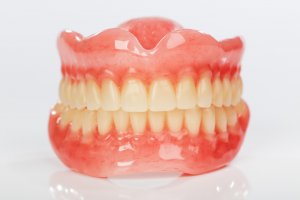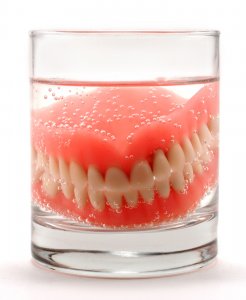If your false teeth are uncomfortable, you might be struggling with loose dentures. Your dentures should fit snugly and comfortably no matter which type of denture or material they are made from. However, this isn’t always the case and if your dentures become loose they can cause you a lot of discomfort and frustration.
If you want to learn more about ill-fitting dentures and find a solution, keep reading while we discuss the following:
- What causes dentures to become loose?
- What to do if new dentures are loose
- Ways to secure dentures or make them fit better
- Longer-lasting alternatives
Dentures are the most affordable option for replacing missing teeth, but it is important that you look after them so that they last longer. If you end up having to replace your dentures more often they can become quite costly.
So, let’s start by taking a look at what causes dentures to become loose.
What causes dentures to become loose?

Correctly fitting dentures should last for years if cared for and maintained correctly. Unfortunately, there are a few occasions when removable teeth can become loose no matter how well you look after them. Some of the reasons you may have loose dentures include:
- Everyday wear and tear
- Inappropriate denture cleaners
- Damage from chewing hard or chewy foods
- Bone reabsorption
- Time spent fitting and adjusting new NHS dentures
Bone reabsorption
The most common reason for loose dentures is bone reabsorption. This is where your gums shrink and change shape as the jawbone reabsorbs bone. This happens because you no longer have tooth roots in the gum, so the jawbone ceases making new cells.
If your false teeth were already uncomfortable, this problem might have been exacerbated by the pressure from your false teeth sitting on the gums.
Everyday wear and tear
Loose dentures due to everyday wear and tear are also common. Partial and full dentures can be damaged if cleaned incorrectly or left to soak in denture cleaner too long. This is especially true of certain materials such as acrylic resins, which are more susceptible to damage if left to soak in Steradent overnight.

Using hot, or boiling water when cleaning your removable teeth is not recommended as the heat can warp them. Make sure to use lukewarm water so they don’t change shape during your cleaning routine.
Different types of false teeth might need to be cleaned carefully, such as false teeth with metal clasps, so as not to break them. Partial dentures or single tooth dentures are examples of false teeth that should be cared for carefully in case they have small metal attachments.
Everyday wear and tear can also include eating. So, make sure not to bite down on hard or chewy foods, or just try to avoid them altogether.
Ill-fitting dentures
If you are getting new dentures after teeth extractions, it is important that they fit properly. This means waiting for your mouth and gums heal. Until then, you will be given temporary removable teeth to fill the gaps left by your missing teeth.
When you have healed completely, you will be fitted for your permanent dentures. The process of fitting and adjusting removable teeth can take time and patience.
The dentist must first get an impression of your teeth which may take more than one attempt to get perfect. Then, once your dentures are complete, it is especially important to point out anything that doesn’t feel right so adjustments can be made.
Don’t be afraid to ask for a lot of adjustments, it’s important that you get the fit right so that you can avoid future problems with your oral health. If your NHS dentures don’t fit, it is likely due to your dentist’s lack of available time to spend fine-tuning impressions, or making final adjustments.
Remember, if your feeling frustrated, it can also take time to get used to dentures.
Solutions to loose dentures
Wearing false teeth that don’t fit properly or are generally uncomfortable can affect more than just your oral health. They can affect your ability to eat, speak and can become quite sore to wear. So, we advise speaking to your dentist as soon as possible to find a solution.
Can you fix loose dentures?
If your dentures become loose, your dentist might suggest having them remade or relined. A denture reline can help to reshape your dentures so that they fit snugly and comfortably again. It is the process of adding a layer of material to your removable teeth so that they fit better.
Can you make loose dentures fit better?
If you are wondering how to make your dentures fit better, you can use a strong denture adhesive to stabilise and keep them in place until you can get to a dental practice.
Alternatives to false teeth
The most effective alternative to dentures is dental implants, as they are the closest to a natural tooth. A dental implant is a screw-like tooth root that is surgically implanted into the jaw that is then used to support and anchor a false tooth.
Dental implants can support single crowns, bridges and overdentures depending on how many teeth you are missing. Other alternatives include full mouth dentures and all-on-4 dentures which are used to replace most or all of your missing teeth.
Conclusion
False teeth that are uncomfortable, or cause you difficulty when eating or speaking may have become loose. If this is the case and they are making your gums feel sore, or are causing you discomfort speak with your dentist to find a solution.
If it’s not possible to find a quick solution you can use strong dental adhesives to stabilise your dentures until you can get to a dental practice. Solutions for loose dentures include having them remade, or relined. Or, you can go with an alternative treatment like dental implants.
Your dentist is the best person to help you decide what is best for you, whether that is by fixing your existing dentures or by finding an alternative.
Dental Nursing. Denture hygiene – why, when and how. Consulted 19th March 2019.




